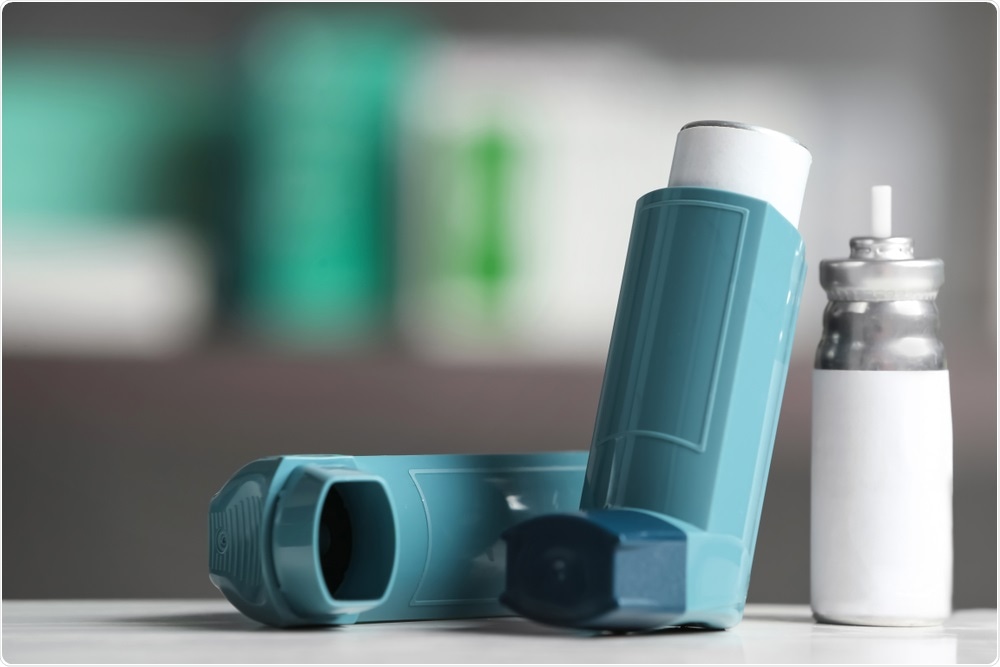Researchers from Queensland University of Technology and Oxford University are working in collaboration to begin human clinical trials of inhaled corticosteroids, commonly used for asthma patients, on patients with COVID-19. The researchers believe that this could be useful for patients with the novel coronavirus infection.

Asthma inhaler. Image Credit: New Africa / Shutterstock
The novel coronavirus or severe acute respiratory syndrome coronavirus 2 (SARS-CoV-2) has infected over 11.79 million people around the world and killed over 543,000 individuals to date.
The virus has led to severe respiratory complications and hospitalization in some individuals. These individuals have needed intensive care and ventilation, and the outcome of these patients is usually poor.
As of now, there are no definitive medications to treat and cure the infection, and there are no effective vaccines to prevent viral infection.
Researchers around the world are in search of drugs that could help reduce the severity of complications of COVID-19. There are currently 21 candidate vaccines in clinical evaluation and 139 candidate vaccines at the preclinical evaluation stage.
Role of corticosteroids in COVID-19
COVID-19 is known to cause severe respiratory illness in some individuals. Studies have shown that some corticosteroids, such as dexamethasone, could reduce the inflammation of the respiratory tract in these patients and benefit them by alleviating the symptoms of severe disease.
Researchers in this new trial are studying if the steroid inhalers used for reducing the exacerbations of asthma could be useful for patients with early COVID-19 and reduce their risk of severe disease.
The paradox
Lead researcher on this team Dan Nicolau, an associate professor at QUT, explained that the asthmatics and those with chronic lung disease and chronic obstructive pulmonary disease (COPD) were on regular inhaler therapy with corticosteroids, were found to have a lesser risk of severe illness in the early phase of the pandemic. He said that this was paradoxical because those with long term lung disease were initially considered to be at a higher risk of a respiratory viral infection such as SARS-CoV-2. He said in his statement, “This seemed paradoxical because COVID-19 affects the lungs – and these patients have lung problems – so they should be more at risk of severe disease from the virus.”
Nicolau said, “One explanation for the low numbers was that something these people were doing regularly was protecting them and that, logically, was that they routinely used inhalers for their chronic lung problems.” “Ideally, it may be that the corticosteroid therapy would be given to anyone with a new, dry cough, and while they are awaiting their COVID test results,” he added.
He explained that based on their speculation, the earlier a corticosteroid inhaler is started for those with symptoms of COVID-19, the lesser their risk of getting severely ill. This speculation, he said, was based on the mathematical modeling by the research team.
The STOIC trial plan
The clinical trial has been registered under the name of STOIC (STerOids In COVID-19). It has begun recruiting patients at the Churchill Hospital in Oxford, England.
The study is being led by Associate Professor Nicolau, who is also a mathematician, physician, and Australian Research Council Future Fellow.
As per the trial details, the researchers have plans to recruit a total of 478 participants in the study. Some of the patients would be administered the corticosteroid (Budesonide) containing inhaler while others would be prescribed a placebo inhaler. Budesonide is widely used for control of symptoms of asthma and prevent its exacerbations.
The trial participants would be those with new-onset symptoms of COVID-19. The researchers wrote that the trial aims to “Evaluate the effect of inhaled corticosteroid (ICS) therapy compared to standard care in participants with early CoVID-19 illness in reducing COVID related emergency department presentations or hospital admissions”. Both male and female patients over the age of 18 years would be included in the trial.
The trial endpoints that would be recorded for each of the participants would be the need for hospitalization within 28 days of inclusion into the trial. Participants would be evaluated and followed up at baseline and then on days 7, 14, and 28.
Implications
If successful, Budesonide inhaler therapy could be a low cost and readily available therapy for early COVID-19 patients. It would reduce their risk of getting severe respiratory complications, Nicolau said. Panic buying and hoarding the inhalers could be a problem in some countries, but in Australia, this should not be a problem.
Nicolau said, “There wouldn’t be the kind of panic buying you see with consumer goods, because there are checks in place... There is a lot of stock around, and, as above, checks and balances on the dispensation of the inhalers would come into play to stop any [panic buying].”
Nicolau added that it would be September before any conclusive results could be obtained from the trial and the efficacy of the inhalers proven. Before that, it is important to wait for concrete evidence, he warned.